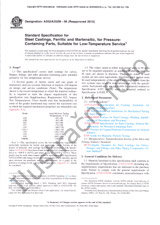Potřebujeme váš souhlas k využití jednotlivých dat, aby se vám mimo jiné mohly ukazovat informace týkající se vašich zájmů. Souhlas udělíte kliknutím na tlačítko „OK“.
ASTM D2240-15(2021)
Standard Test Method for Rubber Property—Durometer Hardness
Přeložit název
NORMA vydána dne 15.6.2021
Informace o normě:
Označení normy: ASTM D2240-15(2021)
Datum vydání normy: 15.6.2021
Kód zboží: NS-1030382
Počet stran: 13
Přibližná hmotnost: 39 g (0.09 liber)
Země: Americká technická norma
Kategorie: Technické normy ASTM
Kategorie - podobné normy:
Anotace textu normy ASTM D2240-15(2021) :
Keywords:
durometer, durometer hardness, hardness, indentation hardness, micro durometer hardness,, ICS Number Code 83.060 (Rubber)
Doplňující informace
| Significance and Use | ||||||||||||||||
|
4.1?This test method is based on the penetration of a specific type of indentor when forced into the material under specified conditions. The indentation hardness is inversely related to the penetration and is dependent on the elastic modulus and viscoelastic behavior of the material. The geometry of the indentor and the applied force influence the measurements such that no simple relationship exists between the measurements obtained with one type of durometer and those obtained with another type of durometer or other instruments used for measuring hardness. This test method is an empirical test intended primarily for control purposes. No simple relationship exists between indentation hardness determined by this test method and any fundamental property of the material tested. For specification purposes, it is recommended that Test Method D785 be used for materials other than those described in 1.1. FIG. 1?(a) Type A and C Indentor |
||||||||||||||||
| 1. Scope | ||||||||||||||||
|
1.1?This test method covers twelve types of rubber hardness measurement devices known as durometers: Types A, B, C, D, DO, E, M, O, OO, OOO, OOO-S, and R. The procedure for determining indentation hardness of substances classified as thermoplastic elastomers, vulcanized (thermoset) rubber, elastomeric materials, cellular materials, gel-like materials, and some plastics is also described. 1.2?This test method is not equivalent to other indentation hardness methods and instrument types, specifically those described in Test Method D1415. 1.3?This test method is not applicable to the testing of coated fabrics. 1.4?All materials, instruments, or equipment used for the determination of mass, force, or dimension shall have traceability to the National Institute for Standards and Technology, or other internationally recognized organizations parallel in nature. 1.5?The values stated in SI units are to be regarded as standard. The values given in parentheses are for information only. Many of the stated dimensions in SI are direct conversions from the U. S. Customary System to accommodate the instrumentation, practices, and procedures that existed prior to the Metric Conversion Act of 1975. 1.6?This standard does not purport to address all of the safety concerns, if any, associated with its use. It is the responsibility of the user of this standard to establish appropriate safety, health, and environmental practices and determine the applicability of regulatory limitations prior to use. 1.7?This international standard was developed in accordance with internationally recognized principles on standardization established in the Decision on Principles for the Development of International Standards, Guides and Recommendations issued by the World Trade Organization Technical Barriers to Trade (TBT) Committee. |
||||||||||||||||
| 2. Referenced Documents | ||||||||||||||||
|
Doporučujeme:
Aktualizace technických norem
Chcete mít jistotu, že používáte pouze platné technické normy?
Nabízíme Vám řešení, které Vám zajistí měsíční přehled o aktuálnosti norem, které používáte.
Chcete vědět více informací? Podívejte se na tuto stránku.




 Cookies
Cookies
